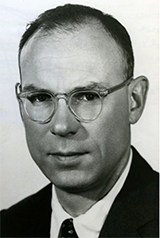Class News
Arthur Howe Jr., Yale Admissions Dean 1956-1964, dies at 93
Arthur Howe Jr. was dean of admissions when the Class of 1964 was admitted to Yale. In a sense, therefore, he was responsible for all of us being at Yale. The following obituary was published in The Yale Daily News on December 24, 2014.
Arthur Howe Jr., prescient on coeducation, dies at 93

Arthur Howe Jr. was named president
of the American Field Service in 1964.
Arthur Howe Jr. ’47, the first Yale admissions dean to publicly advocate for a co-ed student body, died on Dec. 16, according to The Washington Post. His son told The Post that the cause of death was bone-marrow disease.
Howe, who served as dean from 1956 to 1964, considered himself “an aggressive liberal reformer whose mandate was to open up Yale’s student body and nationalize it,” according to The Big Test: The Secret History of American Meritocracy by Nicholas Lemann.
“It’s always been my style to try and change, but to change in ways that I believe are constructive, not just disruptive,” Howe told Yale Alumni Magazine in 1999.
Howe joined the Yale administration in 1951, four years after graduating from the University. As a student, Howe left his studies in 1941 to enlist in the American Field Service, an organization of volunteer ambulance drivers in combat zones, and returned to the University to complete his degree after the war.
In 1956, he was appointed dean of admissions and student appointments and served under Yale President A. Whitney Griswold. Howe pushed for new admissions policies in response to the influx of applications throughout the early 1960s, according to The Post. For instance, Howe played a role in altering admissions policy to increase the likelihood of children of Yale alumni receiving offers of admission.
“If high academic ability were the only criterion, we would have to eliminate quite a few future presidents of the country,” Howe said to The New Yorker in 1960.
Howe also wondered if the University was accepting “a lot of brainy kids who are too egocentric ever to contribute much to society.” Sociologist James Karabel noted in his 2005 book The Chosen: The Hidden History of Admission and Exclusion at Harvard, Yale, and Princeton that throughout Griswold’s tenure, Yale often rejected high-achieving Jews and minorities in favor of “well-rounded” applicants who had graduated from elite boarding schools.
But Howe was also an open advocate of admitting women to Yale College. Though the University had begun admitting female graduate students in 1869, Yale’s undergraduate program was still entirely male when Howe served as dean of admissions. At a faculty gathering, Howe referred to the all-male school as “outmoded,” to which Griswold responded that there was no possibility of female students being admitted, The Post reported.
Still, Howe continued to push for coeducation, and spoke out against Yale’s practice of “endlessly excluding one-half of the population,” he said in 1964. The success of his efforts was seen in 1969, five years after Howe left the University, when the first group of female undergraduate students arrived at Yale.
Howe left his deanship in 1964 to serve as president of the American Field Service. Howe had been an ambulance driver in World War II, where he rose to the rank of major and commanded roughly 120 ambulances and 200 men before returning to the United States, according to The Post.
Howe, a Connecticut native, was born in July of 1921 and graduated from the Hotchkiss School in 1938 before attending Yale. According to The Post, he is survived by his wife, four children, ten grandchildren, and five great-grandchildren.

